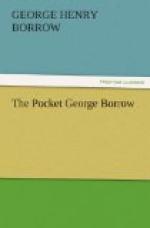Here I interrupted the jockey. ‘You may call it a blackguard fashion,’ said I, ’and I dare say it is, or it would scarcely be English; but it is an immensely ancient one, and is handed down to us from our northern ancestry, especially the Danes, who were in the habit of giving people surnames, or rather nicknames, from some quality of body or mind, but generally from some disadvantageous peculiarity of feature; for there is no denying that the English, Norse, or whatever we may please to call them, are an envious, depreciatory set of people, who not only give their poor comrades contemptuous surnames, but their great people also. They didn’t call you the matchless Hurler, because, by doing so, they would have paid you a compliment, but Hull over the Head Jack, as much as to say that after all you were a scrub: so, in ancient time, instead of calling Regner the great conqueror, the Nation Tamer, they surnamed him Lodbrog, which signifies Rough or Hairy Breeks—lod or loddin signifying rough or hairy; and instead of complimenting Halgerdr, the wife of Gunnar of Hlitharend, the great champion of Iceland, upon her majestic presence, by calling her Halgerdr, the stately or tall, what must they do but term her Ha-brokr, or High-breeks, it being the fashion in old times for Northern ladies to wear breeks, or breeches, which English ladies of the present day never think of doing; and just, as of old, they called Halgerdr Longbreeks, so this very day a fellow of Horncastle called, in my hearing, our noble-looking Hungarian friend here, Long-stockings. Oh, I could give you a hundred instances, both ancient and modern, of this unseemly propensity of our illustrious race, though I will only trouble you with a few more ancient ones; they not only nicknamed Regner, but his sons also, who were all kings, and distinguished men; one, whose name was Biorn, they nicknamed Ironsides; another, Sigurd, Snake in the Eye; another, White Sark, or White Shirt—I wonder they did not tall him Dirty Shirt; and Ivarr, another, who was king of Northumberland, they called Beinlausi, or the Legless, because he was spindle-shanked, had no sap in his bones, and consequently no children. He was a great king, it is true, and very wise, nevertheless his blackguard countrymen, always averse, as their descendants are, to give credit to anybody, for any valuable quality or possession, must needs lay hold, do you see—’
But before I could say any more, the jockey, having laid down his pipe, rose, and having taken off his coat, advanced towards me.
* * * * *
I informed the landlord that he was right in supposing that I came for the horse, but that, before I paid for him, I should wish to prove his capabilities. ‘With all my heart,’ said the landlord. ’You shall mount him this moment.’ Then going into the stable, he saddled and bridled the horse, and presently brought him out before the door. I mounted him, Mr. Petulengro putting a heavy whip into my hand, and saying a few words to




